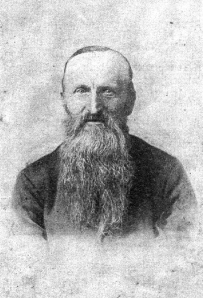Julius August Lencer
Julius August Lencer (born August 25, 1833 in Hastrungsfeld , † May 10, 1903 in Bittstädt ) was a German composer , teacher and botanist ( pomologist ).
Childhood and youth
Lencer was born in Hastrungsfeld as the son of the school teacher Georg Wilhelm Lencer, but grew up with his great aunts in Gotha due to the early death of his mother in 1835. In 1841 his father married again. This marriage, too, lasted only a short time: a few months after the birth of the second child, a son, the mother died in October 1845 of wasting fever. Lencer left school in 1846. From 1851 to 1857 he attended the teachers' college in Gotha. His father died in 1855.
Marriage and work history
After his military service and a first job as a school teacher in Teutleben (1857), he met the Gotha baker's daughter Auguste Tecla Gräfenhahn, with whom he married on February 2, 1858. Four months later, daughter Anna Louis Antonie was born. In the same year, at the age of 25, he came to Bittstädt as a provisional teacher. In 1859 he was called up for military service and had to leave his wife and child. During his absence, the teaching position was not filled and the schoolchildren had vacancies. After 10 weeks he came back. On June 8, 1860, Lencer was given permanent employment and the associated higher salary.
In 1860 he took over the leadership of the church choir ("Singchor"). The choir regulations he designed for the church choir in 1861 on behalf of Pastor Bonsack were confirmed on February 24, 1862 by the Gotha Church and Education Authority. That was the hour of birth of the Bittstädter Liedertafel association . In addition to his work as a choir director, he worked as a composer. Three scores of his compositions ( cantatas for choir and organ) have survived today. His main field of activity was in the field of botany. In the middle of the 19th century, fruit tree cultivation and care was gradually introduced as a school subject in schools. In 1874, Bittstädt was the only place in the Duchy of Gotha to have a private tree nursery, that of the teacher Lencer. In order to convince other teachers that the knowledge about fruit growing is already imparted in school, he wrote a 38-page booklet about fruit growing and had it printed by the ducal state ministry and distributed to all schools in the duchy. He published 14 scientific papers on fruit growing in his homeland, including pome fruit - wildlings , the sour cherry queen hydrangea and the apple varieties Henzens Goldpepping and the Wilkenburger Währapfel .
At the beginning of the 1870s, Lencer became a full member of the German Pomologists Association, but because of his lack of funds he had to ask for an advance on travel expenses every time in Gotha in order to be able to participate in exhibitions and meetings. He was also involved with his colleague and association member Eduard Lucas , at whose school his son Max was to study in 1884/85, in the preparation of the first international agricultural and horticultural exhibition in Erfurt, which took place from September 9th to 17th, 1875. His reputation among his association colleagues is also reflected in the assumption of the travel costs for a trip to the General Assembly in Würzburg in 1880 . When the statutes of the association were to be revised after Lucas' resignation from the office of chairman, Lencer was appointed to the statutes commission in 1877.
Lencer was also very active in the Arnstadt horticultural association "Flora", to which he has belonged since it was founded in 1877. His membership and lecturing ended in 1892 with the progression of his larynx disease. In 1896 he was retired. His successor was Herrmann Porstmann, a teacher from Dresden who, as was customary at the time, was also a choirmaster.
family
Lencer had nine children with Auguste Tecla Graefenhahn:
- June 14, 1858: Anna Louise Antoine
- April 14, 1860: Anna Selma Bertha Luise Therese Eugenie
- May 11, 1862: Minna Amalie Ottilie
- February 25, 1864: Ida Emilie Antonie Alma
- March 23, 1866: Reinhold Julius Herrmann
- January 29, 1868: Therese Amalie Hermine
- November 8, 1869: Oskar Richard
- November 21, 1872: Max Robert
- January 18, 1875: Friedrich Rudolph Arthur
In October 1895 Lencer fell ill with a larynx disease from which he did not recover. On May 10, 1903, he suffered a stroke. Lencer died and was buried in Bittstädt. In 1908 a plaque was unveiled at the old schoolhouse in his memory.
The people of Bittstadt named a street after him.
Auguste Lencer died on February 19, 1917, almost 14 years after her husband. Her daughters Luise and Minna, who remained unmarried, lived in their parents' house at Arnstädter Straße 97 until 1929 and 1934 respectively. Son Herrmann became a fitter in Gotha, Max became a pomologist after training in Reutlingen and took over the community tree nursery.
Works
- Fruit growing as a subject in elementary school: for d. Schools of the Duchy of Gotha , 1875, Thienemann publishing house
See also
Sources and web links
- Website of the Bittstadt Sebastian Bodinus Circle of Friends
- Thuringian General of July 27, 2011
- Mention of a wedding cantata by Lencer at the Musikhochschule Weimar (PDF; 30 kB)
- Dr. Adolf Gabler: Bittstädt A history and homeland reading book , 2011, gb-Druckerei, Arnstadt
| personal data | |
|---|---|
| SURNAME | Lencer, Julius August |
| BRIEF DESCRIPTION | German composer and botanist |
| DATE OF BIRTH | August 25, 1833 |
| PLACE OF BIRTH | Hastrungsfeld |
| DATE OF DEATH | May 10, 1903 |
| Place of death | Bittstädt |


